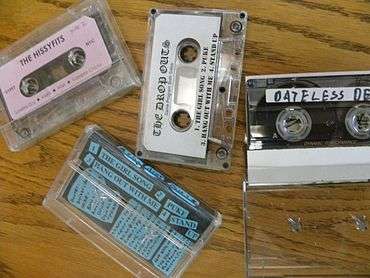Demo (music)

A demo (from "demonstration") is a song or group of songs recorded for limited circulation or reference use rather than for general public release. A demo is a way for a musician to approximate their ideas in a fixed format, such as cassette tape, compact disc, or digital audio files, and to thereby pass along those ideas to record labels, record producers, or to other artists.
Musicians often use demos as quick sketches to share with bandmates or arrangers or simply for personal reference during the songwriting process; in other cases a songwriter might make a demo to send to artists in hopes of having the song professionally recorded, or a music publisher may need a simple recording for publishing or copyright purposes.
Background
Demos are typically recorded on relatively crude equipment such as "boom box" cassette recorders, small four-track or eight-track machines, or on personal computers with audio recording software.
Songwriters' and publishers' demos are recorded with minimal instrumentation - usually just an acoustic guitar or piano, and the vocalist. Both Elton John[1] and Donovan gained studio experience early in their careers by recording publishers' demos for other artists, since their managers also handled music publishing,[2] as did Garth Brooks, who was so impressed when recording the demo of "Friends in Low Places" that he asked to release the song himself (when he did in 1990, it became a major worldwide hit).[3]
Function
Many unsigned bands and artists record demos in order to obtain a recording contract. These demos are usually sent to record labels in hopes that the artist will be signed onto the label's roster and allowed to record a full-length album in a professional recording studio. However, large record labels usually ignore unsolicited demos that are sent to them by mail; artists generally must be more creative about getting the demos into the hands of the people who make decisions for the record company.
Many signed bands and artists record demos of new songs before recording an album. The demos may allow the artist to provide sketches for sharing ideas with bandmates, or to explore several alternate versions of a song, or to quickly record many proto-songs before deciding which ones merit further development. Demos may include as few as one or two songs or as many as would be contained on a full-length album.
Availability
Demo recordings are seldom heard by the public, although some artists do eventually release rough demos in rarities compilation albums or box sets. Other demo versions have been unofficially released as bootleg recordings, such as The Beatles' The Beatles Bootleg Demos and the Beach Boys Sea of Tunes series. Several artists have eventually made official releases of demo versions of their songs as albums or companion pieces to albums. The event of a demo tape appearing on eBay has happened in the past, with the recordings being leaked onto the internet.
In more underground forms of music, such as noise music, black metal or punk, demos are often distributed by bands to fans as self-releases, or sold at a very low price. Amateur (and some professional) musicians may choose to make demos available to interested listeners through websites such as SoundCloud or Bandcamp in order to share new ideas, receive feedback and/or provide fans with "behind the scenes" access to the songwriting process.
Footnotes
- ↑ Vinita (2005). Profiles in Popular Music. Sura Books. p. 79.
- ↑ Billboard 4 Oct 1997, 30 Years of Music: Elton John with Bernie Taupin Billboard Magazine. Retrieved 28 December 2011
- ↑ Collins, Ace. The Stories Behind Country Music's All-Time Greatest 100 Songs. p. 277.